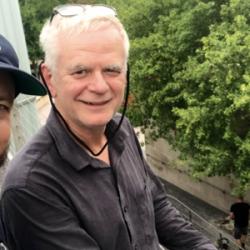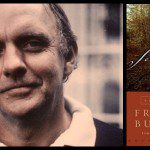 “There is no event so commonplace but that God is present within it, always hiddenly, always leaving you room to recognize him or not recognize him, but all the more fascinatingly because of that, all the more compellingly and hauntingly… Listen to your life. See it for the fathomless mystery it is. In the boredom and pain of it, no less than in the excitement and gladness: touch, taste, smell your way to the holy and hidden heart of it, because in the last analysis all moments are key moments, and life itself is grace.”
“There is no event so commonplace but that God is present within it, always hiddenly, always leaving you room to recognize him or not recognize him, but all the more fascinatingly because of that, all the more compellingly and hauntingly… Listen to your life. See it for the fathomless mystery it is. In the boredom and pain of it, no less than in the excitement and gladness: touch, taste, smell your way to the holy and hidden heart of it, because in the last analysis all moments are key moments, and life itself is grace.”
– Frederick Buechner, Now and Then, p.87.
_________________________________________________________________
Richard Curtis, famed writer and director of “Four Weddings and a Funeral,” and “Love Actually,” and “Knotting Hill” has reportedly made his last film. Why, you ask? The answer, it seems, comes in the form of a final movie: “About Time,” … his statement on what Frederick Buechner calls “the grace of time.”
“About Time” has been critiqued by time-travel fans because it’s inconsistent on time travel dynamics. The Guardian review was unenthusiastic. The New York Times review opines the decline of British manhood toward the “rabbity, passive-aggressive stammerer.” I couldn’t disagree more.
If you haven’t seen the film, consider this your spoiler alert. A quirky and awkward, but intelligent and kind young man named Tim (Dohmnall Gleeson) has just learned from his father (played by Bill Nighy) that men in their family have the ability to travel back in time. There are a few restrictions: they can only travel to a place they have been, and only during their own lives. If they have children, they cannot travel to a time before the child is born, or it will change the child’s identity.
Like all Richard Curtis romantic comedies, “About Time” isn’t really about the romantic relationship at all. In “Four Weddings and a Funeral” we didn’t care as much about the Hugh Grant – Andie MacDowell affair, so much as the relationships between Grant and his odd group of close-knit and eccentric friends. The central question in “Knotting Hill” was if a movie star could allow herself to become a part of a kooky and idiosyncratic group of middle-achieving brits, who happened to be hilariously funny, kind, and loving friends for life.
In “About Time” the father tells his son Tim that the secret to time travel is to live everyday twice. The first time to experience it as it comes; the second time to savor it, and delight in the day without worry and with great joy. The first day Tim lives twice is the real payoff for the film.
The twist is that Tim’s father dies, which is okay for awhile because Tim can travel back in time and talk to his father. Then Tim’s wife becomes pregnant. Once the child is born he can never travel back in time before the birth. The most touching scene finds the son on his last visit to his father before the birth of his own child. During that trip back in time, the father asks the son to accompany him on one last trip back in time. You see the young Tim, maybe age 10, running along the beach with a much younger Bill Nighy, throwing rocks & having fun together – a father’s last wish: to play with his son as a little boy one last time. It’s a touching moment.
The older my children get, the more I realize I would give almost anything to be able to travel back to experience again just one day with my kids when they were little. To play with them as their younger selves, hold their hand and walk together, play silly games and relish the joy and delight of their tiny bodies, high voices, and sweet spirits. To dress them, and bathe them, and put them down for a nap, exhausted myself.
This, I believe is the deep wisdom of Frederick Buechner’s observation about his own life: “There is no event so commonplace but that God is present within it, always hiddenly, always leaving you room to recognize him or not recognize him, but all the more fascinatingly because of that, all the more compellingly and hauntingly…”
The key to happiness is not, as it turns out, getting what you want. The key is that toward which Buechner beckons: “Listen to your life. See it for the fathomless mystery it is. In the boredom and pain of it, no less than in the excitement and gladness: touch, taste, smell your way to the holy and hidden heart of it, because in the last analysis all moments are key moments, and life itself is grace.”
The film ends with Tim revealing what he has learned. He never travels back to live a day twice. Instead he lives every day savoring the moment, enjoying the passage of time, seeing – really seeing – the events of his life with delight and joy. I pray that I will learn how to live my life this way – present to the moment, not dreaming about the future or reprocessing the past… just here right now. I want to enjoy the laughter of my children. I want to play with them, and listen to them talk. I want to pay attention to my wife, and not overlook her singular presence in my life – the joy of knowing and being known at my fingertips all day everyday. I pray that I will not fall into the trap of waiting to be happy when the events of my life work out as I want them to.
I pray I will learn to receive each day recognizing it as a precious gift.












